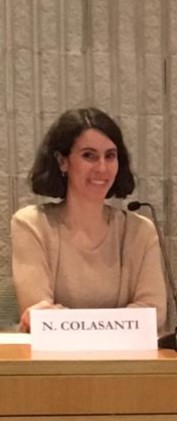Nathalie Colasanti discusses her award winning journal article:
When my coauthors and I started researching democratic confederalism in Northern Syria, we found that it wasn’t a well-known topic in the Western academic community; today, I’m sure most will have heard about it following the recent military operation conducted by Turkey across the Syrian border.
We carried out our investigation with the objective of raising awareness on this innovative, inclusive model which is based on three key pillars: grassroots democracy, ecology and women’s liberation. The difference between democratic confederalism and previous experiments with grass-roots democracy is that its evolutionary pattern aims to include heterogeneous local communities living in the same territories, with the objective of becoming an administrative model for the whole Syrian country, without shattering its national constitution. In fact, the evolution of the political and administrative system and the introduction of the Democratic Federation of Northern Syria were specifically aimed at including all ethnicities and not focusing on the Kurdish population only. Democratic participation is ensured by the bottom-up organisation of the administrative model, which is based on communes (the most “local” level, usually the size of a village or a neighbourhood). These are autonomous in decision-making and self-organisation, and they coordinate through various levels of higher administrative and federal structures. The main idea of democratic confederalism is that the commune is the democratic centre, and higher institutions tend to serve as coordinating structures. The continuous educational work led by activists, aimed at commune residents, allows them to overcome the “democratic problem” according to which the people are not educated and conscious enough of their choices to positively participate in direct democratic processes. In fact, the structure of democratic confederalism allows them to eliminate the disconnection between participatory practices and formal decision-making forums as the two coincide and participation results in decision-making.
Another very interesting aspect is the role of women and the principle of dual leadership, according to which any leadership position has to be jointly held by a man and a woman. Moreover, a 50% presence of women is mandatory is any assembly or committee. In parallel with people’s assemblies and councils, there are women-only councils at all organisational levels, which are responsible for any issue regarding women. Thus, women’s self-determination is truly possible, and their participation is motivated by the acknowledgement of their previous marginalisation.
Democratic confederalism provides an innovative model that is based on participation to decision-making and the centrality of the local, grassroots level. Democracy is defined as an element that is organic to society, that shapes every aspect of organisational and administrative institutions and that is practised on a daily, continuous basis by all those who want to be involved. Everyone can participate to democratic processes and decision-making in their communities, and in fact the greater the participation, the more the common interest for effective and representative decisions is reached. The experience of Northern Syria overcomes limitations linked to the lack of inclusion in participatory experiences, as everyone is encouraged to take part in decision-making. At the same time, democratic confederalism presents itself as an alternative public management system, providing interesting insight for reflecting on the current crisis that democracy is facing at a global level.
Finally, I would like to acknowledge the invaluable support provided by UIKI Onlus (uikionlus.com), the Italian Office for Information on Kurdistan, in helping me to access first-hand data and interviews.
 Nathalie Colasanti is a post-doc researcher at the University of Rome “Tor Vergata”. Her research interests include public management and governance, the commons, workers’ self-management and platform cooperativism. Her article, with co-authors, Grassroots democracy and local government in Northern Syria recently won the prize for best article of Vol 44 of Local Government Studies, by an early career researcher.
Nathalie Colasanti is a post-doc researcher at the University of Rome “Tor Vergata”. Her research interests include public management and governance, the commons, workers’ self-management and platform cooperativism. Her article, with co-authors, Grassroots democracy and local government in Northern Syria recently won the prize for best article of Vol 44 of Local Government Studies, by an early career researcher.
The views in this blog are those of the author and not those of INLOGOV or the University of Birmingham.